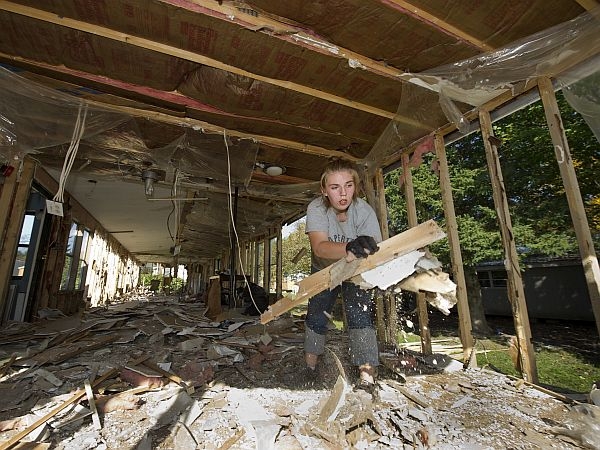
(Host) In the ten weeks since Tropical Storm Irene ravaged the state, Vermonters have given generously to help those whose lives were up-ended by the storm.
Non-profit officials say at least $7 million has been raised through a combination of statewide efforts and dozens of local funds.
VPR’s John Dillon follows the money.
(Dillon) Kara Fitzgerald and Ryan Wood-Beauchamp lost their land and their livelihood to the storm. The young farmers saw the Mill River in Cuttingsville drown their crops and sweep the topsoil off the fields.
The couple is determined to start over in a new place. But with a mortgage and much of the value of their land gone, they needed help to get back in business. That’s where the private funds have stepped in. So far they’ve received roughly $70,000 through grants and individual donations.
(Wood Beauchamp) "We received a grant from the Vermont Community Foundation, $10,000 dollars.
(Fitzgerald) "And through NOFA was a 5 thousand dollar grant. People write us letters and enclose money. Everything that we’re accepting in donations is strictly to restart a farm."
(Dillon) NOFA is the Northeast Organic Farming Association of Vermont. It’s raised $170,000 for organic farms damaged by the storm. The Vermont Community Foundation also has a dedicated fund for farmers.
Community Fund President Stuart Comstock-Gay says the foundation mobilized in the week after the storm to advise donors on where money was needed. It then set up specific funds to fill the gaps.
(Comstock-Gay) "And so we quickly jumped in and said, ‘OK, who’s already doing the things on the ground?’ And make sure they get the attention they need. And let’s find the areas where nobody’s doing it and fill that."
(Dillon) That analysis led to the farm program, a fund to help non-profits, and a separate pot of money to help mobile home residents dispose of their damaged buildings.
The foundation also serves as an information clearinghouse for the dozens of local efforts that have sprung up around the state. A spreadsheet posted on the foundation’s web site lists pages and pages of local funds and volunteer organizations all helping with Irene.
Of the $7 million that’s been raised, the Community Foundation oversees $3.3 million. Local groups have raised $2 million. Then there’s $1.6 million raised by the Vermont Long Term Disaster Recovery Group, a body appointed by the governor to steer long-term recovery efforts.
Chris Graff, a former journalist and now an executive with National Life in Montpelier, is the group’s secretary. Graff says the goal is to pick up where FEMA or other programs leave off.
Graff predicts at least $10 million will be needed for long term recovery efforts. But just as important, he says, is helping people navigate the programs and resources that are available at the state and local level. His organization will use caseworkers to make the process easier.
(Graff) "It can’t be a maze for the flood victims. It has to be simple. And that what the long term disaster recovery group is doing, working with a lot of partners, the voluntary organizations, the state, the Vermont Community Foundation, trying to make sure the flood victims have one place to go and one caseworker to help them, from day one."
(Dillon) Some Irene-related causes have been relatively easy to fundraise for. Farm initiatives have raise money with little effort probably because Vermont agriculture has an iconic, national image.
Todd Bailey, a Montpelier lobbyist, stepped in after Irene to raise money for other Vermont businesses that may not have such a well known brand.
(Bailey) "There’s a real need to support businesses with grants as opposed to loans so that they can get some recovery effort going quickly instead of having to go through that process of acquiring loans that may take a long time or may be an interest rate or a lien that they can’t afford."
(Dillon) The business focused fund has raised about $350,000, and hopes to exceed half a million.
Comstock-Gay from the Community Foundation says donors want their money to go to work quickly. But the public also expects accountability on how the funds are used.
(Comstock-Gay) "People should be asking us, they should be asking the long term fund, the Red Cross, ask all of us: ‘what are you doing with this, and how’s it going?’ And know that we can be better at it, and know that we are moving it out as fast as we can. But we also want to be responsible with it."
(Dillon) He says his foundation has waived any management fees for the Irene funds it oversees.
For VPR News, I’m John Dillon